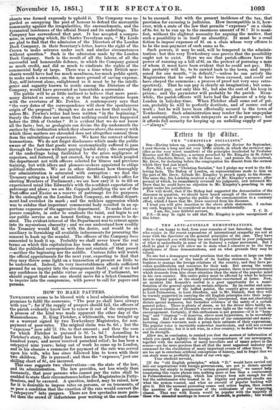HOW TO MAKE PAUPERS.
TEWKESBURY seems to be blessed with a local administration that promises to fulfil the assurance, "The poor ye shall have always with you " ; for if the supply of paupers should fail, the officers of the parish evidently know how to renew it out of the ratepayers. A. process of the kind was made apparent the other day at the Mansionhouse. B. Ring Fletcher, a whitesmith, was brought up on a warrant signed by two Tewkesbury Magistrates, for non- payment of poor-rates. The original claim was 8s. 6d. ; but the "expenses" now add 71. 19s. to that amount; and thus the sum for which Fletcher is pursued is Si. 7s. 6d. ! According to Fletcher's story, his family has been known in Tewkesbury for a hundred years, and never received parochial relief; he has been a tutepayer nine years ; being out of work he came up to London, and in his absence a summons for payment of the rate was served upon his wife, who has since followed him to town with their two children. He is pursued ; and thus the " expenses," just one EMI/jug short of 81., are incurred.
This ease suggests two observations—on the state of the law, and its administration. The law provides, not less wisely than humanely, that poor persons who cannot pay the rates shall be enabled to state their circumstances before the Magistrates in Petty- Sessions, and be excused. A question, indeed, may be raised, how far it is desirable to impose rates on persons, or on tenements, of S0 poor a condition that the exaction of the rate would convert the "ratepayers into paupers. There are few spectacles more pain- ful than the crowd of industrious poor waiting at the courthouse to be excused. But with the present incidence of the tax, that provision for excusing is judicious. How incompatible is it, how- ever, with a state of the law that permits " expenses" on a claim of 8s. 6d. to be run up to the enormous amount of 81.! It is mani- fest, without the slightest necessity for arguing the matter, that such a possibility is in itself an absurdity. It must be a cruel fiction to impose expenses of 81. on a class whose very offence is to be the non-payment of such sums as 8s.
Such powers, it may be said, will be tempered in the adminis- tration : but this very Tewkesbury case proves that the possibility ought not to exist. Here we see that parish-officers have the power of running up a bill of 81. on the pretext ofpursuing a man of whom it must have been evident that he could not pay. His fate probably will be, to be carried back to the town, and impri- soned for one month, " in default,"—unless he can satisfy the Magistrates that he ought to have been excused, and could not have obeyed the summons ; a process of proof not very easy retro- spectively. That he can pay is clearly an imagination ; but some- body must pay, not only this 81., but also the cost of his keep in prison ; and the paymaster will probably be the parish. Mean- while, the parish-officers will have had the pleasure of a trip to London in holyday-time. When Fletcher shall come out of pri- son, probably he will be perfectly destitute, and of course out of work ; but he will have been effectually secured to the town of Tewkesbury. Such administration may render the law unpopular and contemptible, even with ratepayers as well as paupers ; but it affords full security for keeping up an unfailing supply of poor —" always."


























 Previous page
Previous page